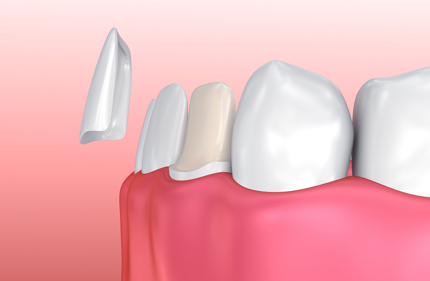Veneers
About Veneers
The fastest way to get your perfect smile is dental veneers. Veneers are thin porcelain shells that are put on your teeth. As a rule, veneers serve cosmetic purposes. However, they do strengthen a tooth’s structure and can pretty much replace natural enamel, which is apparently more vulnerable to adverse outer influences than porcelain. It takes 2 visits (separated by a week) to the office to complete treatment, but the results are instant and beautiful!
When are they used?
Veneers are used to correct discolored, chipped, misaligned or irregular teeth. Also, they can help to eliminate gaps between teeth. Many people, who have undergone the procedure, say they no longer feel awkward when smiling. If you believe you need veneers installed on your teeth, you must be ready to go through a handful of consultations and preparatory steps.
How are they fixed?
The procedure is carried out at a dentist’s office and requires thorough preparation, because there are contraindications. You must be ready to have your teeth and the entire mouth checked for a number of conditions. With porcelain veneers, your dentist may give you a local anesthetic (freezing). Your dentist then removes a thin layer of the enamel from your teeth to make room for the veneers. Then your dentist makes a mold of your teeth. This mold is used to custom-make your porcelain veneers. In the meantime, your dentist may place temporary veneers to replace the portion of the tooth that was removed. These are worn until your porcelain veneers are ready. The temporary veneers are very fragile and need to be treated gently during eating and cleaning as they come loose very easily.
At your next visit the temporary veneers are replaced with the permanent lab created porcelain veers. To ensure proper bonding, the dentist will roughen your tooth and place the veneer on it several times to make sure it fits properly. Then the dentist will apply cement, place the veneer, and expose it to a kind of light that causes the cement to harden. After that, some minor adjustments may be needed to correct the bite and remove excess materials from your teeth. You will need to make one or two follow-up visits.
How long do they last?
If installed properly and providing that you care for them well and follow all recommendations, your bright smile will be there for another 10 to 15 years. After that, you will need to repeat the procedure.
How do I care for my veneers?
Veneered teeth need the same care as non-veneered ones: rinsing, brushing, flossing, etc. Veneers do not stain as badly as natural dental enamel does. However, your dentist will recommend you to reduce the amount of food and drinks which usually cause teeth to discolor: wine, coffee, and tea; cutting down on cigarettes is even more advisable.
Who can get veneers?
Not everyone is a good candidate for veneers. Here are some reasons why your dentist may suggest treatments other than veneers:
- If a tooth has decay or is in an area that has gum disease. These problems must be treated first.
- If a tooth has little enamel left, a veneer will not stick to it properly.
- If too much of the tooth is missing, a crown may be another option.
- If a person grinds or clenches his or her teeth. This habit is called bruxism and can chip or break porcelain veneers.
What is good about them?
- Once veneers are placed on your teeth, they will look very natural. There will be no telling which of your teeth are veneered, and which are not.
- Porcelain veneers are stain-resistant.
- They do not disturb the gum tissue or cause any adverse reactions.
- Unlike crowns, veneers require only minor shaping of teeth.
What Else Should I Know?
- Once a tooth gets trimmed, it will not regain enamel by itself. Therefore, every next time you have your teeth veneered, the enamel will grow thinner.
- There is no possibility of rescuing a damaged veneer, so it will need to be replaced anyway.
- Just like your natural teeth, your veneered tooth needs to be brushed and flossed daily.
- If the veneers are not fully placed or sealed onto your tooth, stains or cavities can form under the veneer.
- Once you have veneers, you cannot reverse the treatment because part of your enamel has been removed.
- If a veneer chips or peels off, or if a cavity forms under a veneer, the veneer must be redone. The other option is to put a crown on the tooth.
- Constantly grinding or clenching your teeth may cause your bonding or veneers to chip or break.
- Porcelain veneers and bonded teeth can be chipped if you are not careful when biting or tearing into hard or chewy foods. Do not bite hard objects like ice cubes or fingernails.
- Cosmetic dental treatments like bonding or veneers might not be covered by your dental plan. You may be responsible for those costs yourself.
Call Alpha Dental Care today at 905-876-0200 to learn about our cosmetic dentistry services at Milton and surrounding areas.

